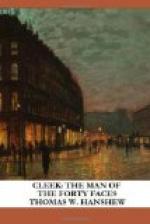In his heart he knew that if any advance was to be made, that advance was the man’s duty, not the woman’s; but the fear that she would think he was thrusting himself upon her, the dread that even yet the white soul of her could not but shrink from a closer association with him, kept him from taking one step towards breaking the silence he deplored.
The French have a proverb which says: “It is always the unexpected that happens.” And it was the unexpected that happened in this case.
In the midst of his dejection, in the very depths of returning despair, there came to him this note from Mr. Narkom:
“My Dear Cleek,
“Kindly refrain from going out this evening. I shall call about nine o’clock, bringing with me Miss Ailsa Lorne, whom you doubtless remember, and her present patron, Angela, Countess Chepstow, the young widow of that ripping old warhorse, who, as you may recall, quelled that dangerous and fanatical rising of the Cingalese at Trincomalee. These ladies wish to see you with reference to a most extraordinary case, an inexplicable mystery, which both they and I believe no man but yourself can satisfactorily probe.
“Yours in haste,
“Maverick Narkom.”
So, then, he was to see her again, to touch her hand, hear her voice, look into the eyes that had lighted him back from the path to destruction! Cleek’s heart began to hammer and his pulses to drum. Needless to say, he took extraordinary care with his toilet that evening, with the result that when the ladies arrived there was nothing even vaguely suggestive of the detective about him.
“Oh, Mr. Cleek, do help us—please do,” implored Ailsa, after the first greetings were over. “Lady Chepstow is almost beside herself with dread and anxiety over the inexplicable thing, and I have persuaded her that if anybody on earth can solve the mystery of it, avert the new and appalling danger of it, it is you! Oh, say that you will take the case, say that you will save little Lord Chepstow and put an end to this maddening mystery!”
“Little Lord Chepstow?” repeated Cleek, glancing over at the countess, who stood, a very Niobe in her grief and despair, holding out two imploring hands in silent supplication. “That is your ladyship’s son, is it not?”
“Yes,” she answered, with a sort of wail; “my only son—my only child. All that I have to love—all that I have to live for in this world.”
“And you think the little fellow is in peril?”
“Yes—in deadly peril.”
“From what source? From whose hand?”
“I don’t know—I don’t know!” she answered, distractedly. “Sometimes I am wild enough to suspect even Captain Hawksley, unjust and unkind as it seems.”
“Captain Hawksley? Who is he?”




